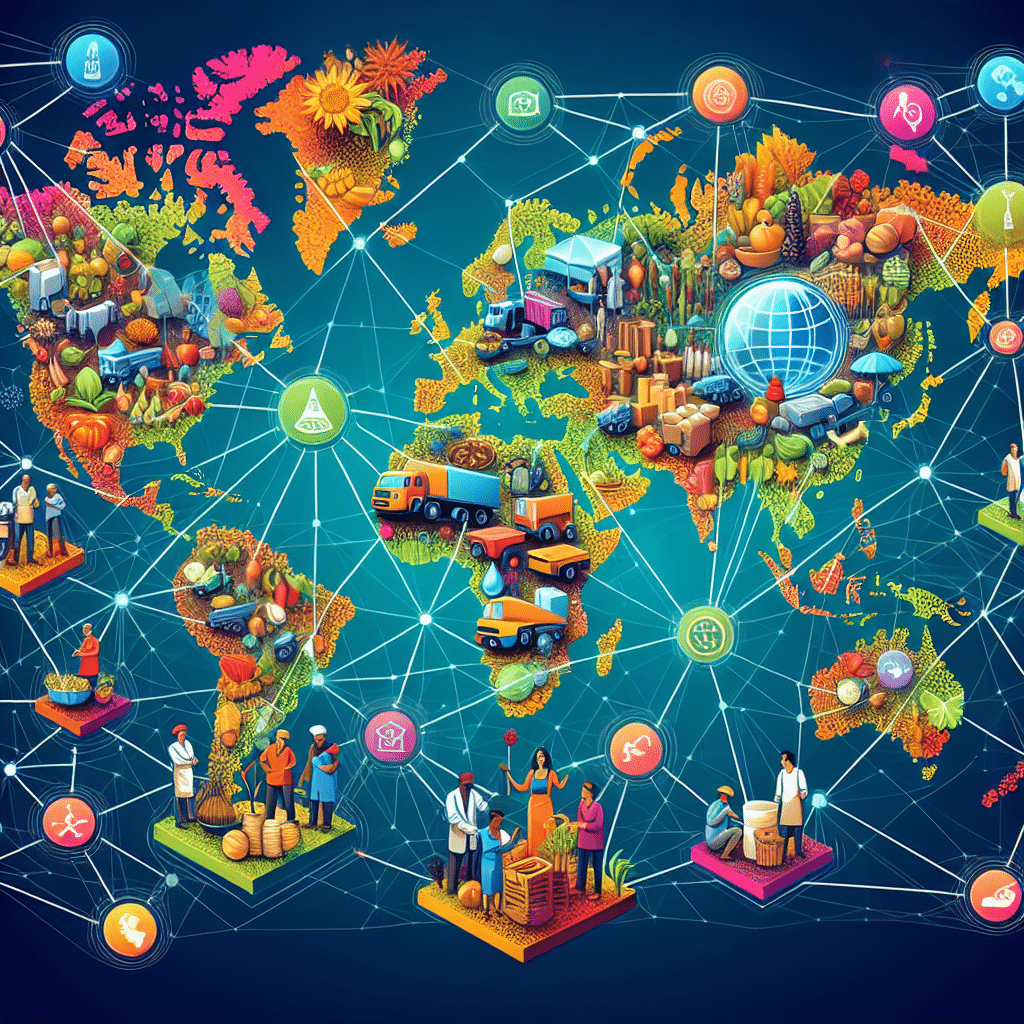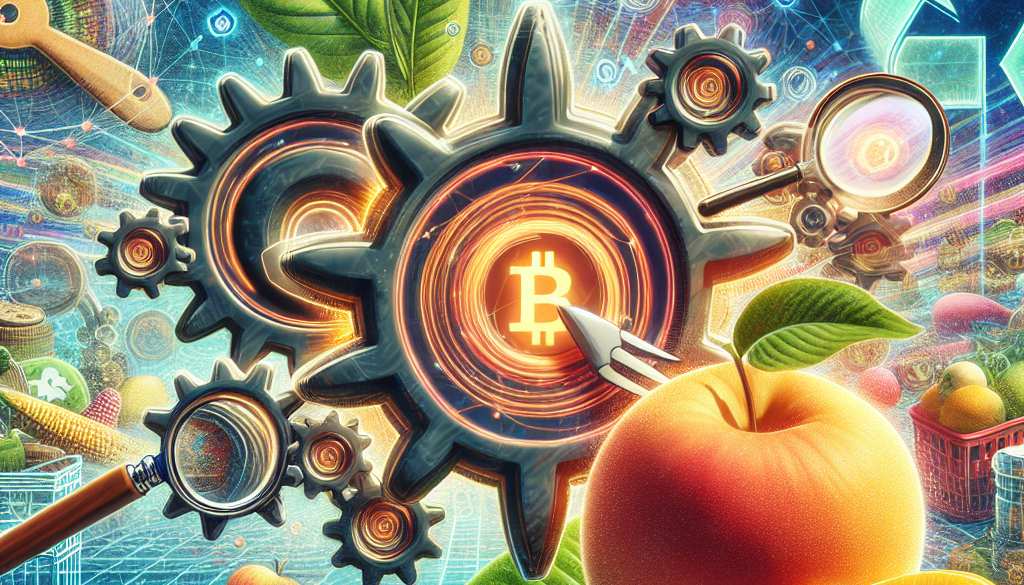Blockchain to Drive Food Safety and Sustainability
-
Table of Contents
- Blockchain Enhances Food Safety and Sustainability
- The Role of Blockchain in Food Traceability
- Blockchain’s Impact on Food Safety
- Advancing Sustainability with Blockchain
- Case Studies and Statistics
- Challenges and Considerations
- Conclusion: Embracing Blockchain for a Safer, Greener Future
- ETprotein: Pioneering Sustainable Protein Solutions
Blockchain Enhances Food Safety and Sustainability

In an era where food safety and sustainability are of paramount importance, blockchain technology emerges as a transformative force. This decentralized digital ledger has the potential to revolutionize the way we track, manage, and ensure the integrity of the food supply chain. By fostering transparency and traceability, blockchain can help mitigate foodborne illnesses, reduce waste, and promote responsible sourcing. In this article, we delve into how blockchain is driving advancements in food safety and sustainability, and why it could be the key to a more secure and eco-friendly future.
The Role of Blockchain in Food Traceability
Food traceability is a critical aspect of food safety. It involves the ability to track the production, distribution, and consumption of food. Blockchain technology offers an unprecedented level of traceability by providing a tamper-proof record of every transaction within the supply chain.
- Real-time Tracking: Blockchain enables real-time tracking of food products from farm to table. This rapid information sharing allows for immediate action in case of a food safety issue.
- Reduction of Fraud: The immutable nature of blockchain records helps in reducing fraud, as each product can be verified against its digital ledger entry.
- Enhanced Transparency: Consumers can access the complete history of the food they purchase, including where it was grown, processed, and stored.
Blockchain’s Impact on Food Safety
Food safety is a global concern, with the World Health Organization estimating that almost 1 in 10 people fall ill every year from eating contaminated food. Blockchain can significantly reduce these numbers by improving the detection and removal of unsafe products from the market.
- Quick Response to Contamination: Blockchain’s traceability features allow for rapid identification and recall of contaminated products, thereby minimizing health risks.
- Regulatory Compliance: Blockchain can help food producers and retailers comply with food safety regulations by maintaining an accurate and accessible record of compliance data.
- Data Integrity: The decentralized nature of blockchain ensures that all stakeholders maintain consistent data, reducing the risk of errors that could lead to safety breaches.
Advancing Sustainability with Blockchain
Sustainability in the food sector involves responsible sourcing, reducing waste, and minimizing the carbon footprint. Blockchain technology can play a significant role in achieving these sustainability goals.
- Responsible Sourcing: Blockchain can verify the authenticity of claims related to organic or fair-trade products, ensuring that they meet certain sustainability standards.
- Waste Reduction: By improving supply chain efficiencies, blockchain can help reduce food waste by ensuring that products are sold before they spoil.
- Carbon Footprint Tracking: Blockchain can track and report on the carbon footprint of food products, encouraging more environmentally friendly practices.
Case Studies and Statistics
Several companies and organizations have already begun implementing blockchain to enhance food safety and sustainability. For instance, IBM’s Food Trust blockchain platform has partnered with major retailers like Walmart to improve food traceability. According to a study by Juniper Research, blockchain deployments in the food supply chain could save businesses over $31 billion by 2024 through reductions in food fraud and improved compliance costs.
Challenges and Considerations
Despite its potential, blockchain adoption in the food industry faces challenges. These include the need for standardization across different blockchain platforms, ensuring the accuracy of data entered into the blockchain, and the technological and financial barriers to entry for smaller producers.
Conclusion: Embracing Blockchain for a Safer, Greener Future
Blockchain technology holds the promise of a more transparent, efficient, and safe food supply chain. By enabling real-time tracking, reducing fraud, and promoting sustainability, blockchain can help ensure that the food we consume is not only safe but also responsibly sourced. As the technology matures and adoption grows, we can expect to see significant improvements in global food safety and sustainability.
ETprotein: Pioneering Sustainable Protein Solutions
In line with the values of sustainability and safety, ETprotein company’s protein products stand out as a beacon of quality and eco-friendliness. Their extensive range of organic bulk vegan proteins and L-(+)-Ergothioneine (EGT) products are produced with the highest standards, ensuring that consumers receive nutritious and sustainable protein options. By choosing ETprotein, consumers and manufacturers can contribute to a healthier planet while enjoying the benefits of high-quality protein sources.
About ETprotein:
ETprotein, a reputable protein and L-(+)-Ergothioneine (EGT) Chinese factory manufacturer and supplier, is renowned for producing, stocking, exporting, and delivering the highest quality organic bulk vegan proteins and L-(+)-Ergothioneine. They include Organic rice protein, clear rice protein, pea protein, clear pea protein, watermelon seed protein, pumpkin seed protein, sunflower seed protein, mung bean protein, peanut protein, and L-(+)-Ergothioneine EGT Pharmaceutical grade, L-(+)-Ergothioneine EGT food grade, L-(+)-Ergothioneine EGT cosmetic grade, L-(+)-Ergothioneine EGT reference grade and L-(+)-Ergothioneine EGT standard. Their offerings, characterized by a neutral taste, non-GMO, allergen-free attributes, with L-(+)-Ergothioneine purity over 98%, 99%, cater to a diverse range of industries. They serve nutraceutical, pharmaceutical, cosmeceutical, veterinary, as well as food and beverage finished product distributors, traders, and manufacturers across Europe, USA, Canada, Australia, Thailand, Japan, Korea, Brazil, and Chile, among others.
ETprotein specialization includes exporting and delivering tailor-made protein powder and finished nutritional supplements. Their extensive product range covers sectors like Food and Beverage, Sports Nutrition, Weight Management, Dietary Supplements, Health and Wellness Products, and Infant Formula, ensuring comprehensive solutions to meet all your protein needs.
As a trusted company by leading global food and beverage brands and Fortune 500 companies, ETprotein reinforces China’s reputation in the global arena. For more information or to sample their products, please contact them and email sales(at)ETprotein.com today.












